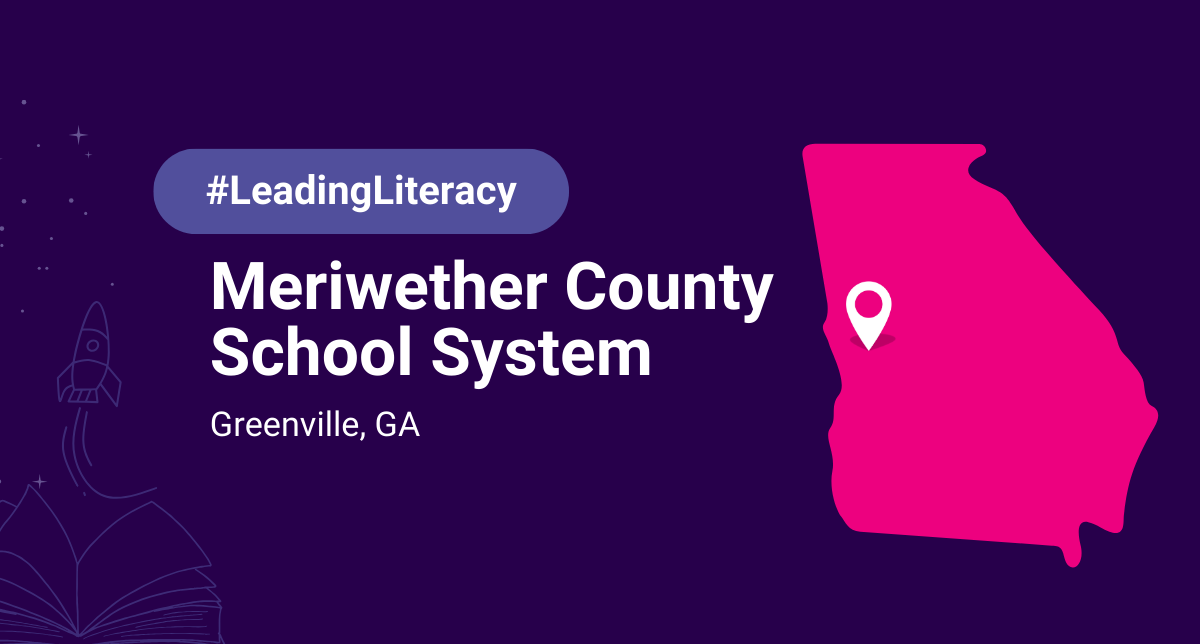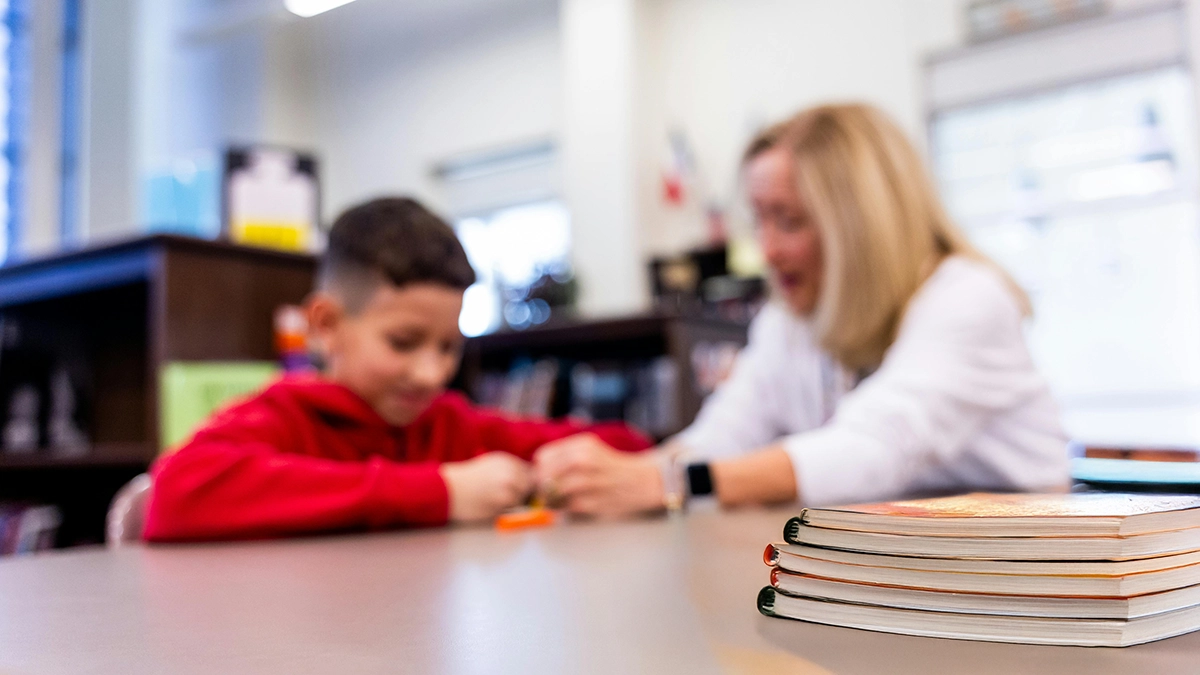“Did you see the green? There’s green!”
That’s what Meriwether County teachers started saying this year when they pulled up their iReady diagnostic results. Green meant on-grade-level readers — something many had never seen before in their classrooms.
Five years ago, the rural Georgia district had multiple schools on the state’s bottom 5% list. Today, every school is off it — a first in district history.
We sat down with Dr. Monica McDaniel, Ed.D., director of curriculum and instruction for Meriwether County School System, to learn about the Georgia district’s remarkable transformation and what other districts can borrow from their literacy playbook.
The Challenge: A District at the Breaking Point
When McDaniel first began working with Meriwether County through her role at one of the state’s Regional Education Service Agencies (RESA), the situation was dire. Multiple schools were on Georgia’s state improvement list, landing in the bottom 5-10 percent of schools across the state.
“I remember going to one of the schools that eventually closed, and I did not sleep that night after I left,” McDaniel recalls. “It didn’t sit in my heart that I knew those babies were in that building.”
If they were going to turn literacy outcomes around, the district needed to address significant systemic gaps:
- Students deserved better than the frequent curriculum changes and short-lived initiatives they’d experienced
- Teachers lacked the foundational phonics resources and consistent support systems necessary to help every child succeed
- Located in a rural community with a poverty rate that 165 percent higher than the rest of the state, the district needed partners who understood that their work had to include strong family and community connections
- Most critically, there was no foundational phonics instruction at the elementary level — a gap that affected every student’s ability to become a confident reader
McDaniel saw challenges, but she also something else: potential.
So when the curriculum director position opened in Meriwether County, she made a decision that would change the trajectory of thousands of students’ lives.
“I felt like I had to at least try to be in the running for it,” she explains. “I had watched the district, year over year, change resources. They tried something a year, and sometimes it didn’t even last a year. I could not bear with myself if I didn’t at least try to come in and do the work.
Building the Foundation: Strategic Partnership and Planning
The Power of Regional Support
One of Meriwether’s key advantages has been its partnership with West Georgia RESA, which helped the district conduct comprehensive audits to identify exactly where the gaps existed.
“RESA was huge in helping us understand what’s your focus,” McDaniel notes. “I mean, it was glaring for us that it was literacy, but what about literacy?”
Through this partnership, the district identified critical needs:
- A viable, evidence-based curriculum
- Proper curriculum documentation and resources
- Universal screening tools that provided reliable data
- A comprehensive phonics program
The district also secured transformational grant funding, including the L4GA (Leading for Georgia’s Learners) grant and support through RESA’s Growing Readers initiative, which provided ongoing, job-embedded professional learning with coaching cycles.
A Dissertation That Became a District Blueprint
As the team in Meriwether County was working to rebuild its literacy ecosystem, their director of curriculum was simultaneously pursuing her doctorate, asking a critical question: What type of professional development structure actually helps underperforming students learn to read?
Her research subject was right in front of her. She watched Meriwether participate in Growing Readers, a program through RESA where specialists partnered with schools to teach teachers how to teach reading. What she observed in her own district became the foundation of her study.
“I felt like it was very successful, because it had that ongoing, job-embedded professional learning. Not only that, it had coaching,” McDaniel explains. “So, they would learn it. The coach would come out and model it, the coach would come out and watch them, and they had that continuous feedback cycle.”
This wasn’t just about what worked.
It was about understanding why it worked from the teachers’ perspective. Her dissertation examined teacher experiences with different professional development structures, and the findings challenged everything districts typically do.
The research revealed several critical insights that have formed a blueprint for how Meriwether approaches professional development:
- One-day PD sessions fail. Teachers need time to absorb, practice, and refine new strategies, not a single workshop and a binder that sits on a shelf.
- Job-embedded training is essential. Professional learning must happen in the context of actual classroom practice, not in isolation from the daily work.
- Coaching cycles create lasting change. Teachers need someone to model the practice, watch them implement it, and provide continuous feedback—not just initial training.
- Everyone must be at the table. “The other thing that kind of came out in my dissertation was the importance of all the players being at the table,” McDaniel says. “That it is not just at the teacher level. It has to be from the district, it has to be from the school, it has to be at the teacher level, and, you know, even your partners. Everyone has to know what’s going on, and everyone has to play a role.”
These findings became non-negotiable principles. “Through that work, and watching how that was done, that’s how I do PD,” McDaniel says firmly. “It is very, very rarely one and done. It is always job embedded, it is always ongoing. When possible, I have people come in as a coaching cycle.”
Every initiative Meriwether has implemented since — from Fundations phonics to iReady to Ignite Reading — has followed this research-based structure. No exceptions.
Building Systems That Last
Curriculum and Assessment: Getting the Fundamentals Right
When audits revealed that Meriwether had absolutely no phonics instruction at the elementary level, the district moved decisively. They implemented Fundations (Wilson) for K-2 phonics instruction, eventually extending it to 3d grade.
The district also decided to change up its assessment process, moving from STAR to iReady because the latter is criterion-referenced.
“That gave us a new perspective and new measures to look for and put us on a more even playing field, because now we’re not looking at comparative to us, but we’re looking at across the standard,” McDaniel explains.
Professional Development: The Non-Negotiable Investment
Following her research findings, McDaniel insisted on comprehensive, sustained professional development for every new initiative.
“It is very, very rarely one and done. It is always job embedded, it is always ongoing,” McDaniel emphasizes. “When possible, I have people come in as a coaching cycle.”
How Meriwether Implemented Fundations Phonics: A Model for Sustainable Change
When Meriwether adopted Fundations (Wilson) for phonics instruction, they didn’t just hand teachers a curriculum and wish them luck. They built a multi-year support system:
Year One:
- Teachers received initial training up front
- Virtual implementation support sessions continued monthly or every other month throughout the year
- External coach hired to model lessons and conduct classroom walkthroughs
- Continuous feedback loop between coaches and teachers
Year Two:
- Instructional coaches became Fundations-certified
- Coaches taught actual lessons during summer programming, giving them hands-on experience with the curriculum
- This experience led to critical insights: “When they started going in and doing the process, they realized, like, we have to do something differently about this. This is too much, we need to move and shave times, and so it just keeps helping the process get better and better,” McDaniel explains.
Every Year After:
- All new teachers receive the same comprehensive training
- Support cycle continues for teachers new to the program
- District refines implementation based on ongoing coach feedback
The result? Teachers don’t just have a curriculum — they have deep understanding of how to use it effectively.
The district also took the innovative approach of creating specialized teams to handle intensive requirements like Georgia’s literacy legislation, rather than overwhelming all classroom teachers. EIP teachers, special education teachers, and instructional coaches went through LETRS training. All teachers, meanwhile, participated in the Cox Campus modules stretched over three years with ongoing professional learning sessions between modules.

Innovative Staffing Model
One of Meriwether’s most impactful decisions was restructuring elementary grade levels with a unique two-teacher model. There’s now a grade-level content teacher who focuses on core instruction and a support teacher who handles interventions, small groups, and progress monitoring.
“That has been a game changer for us,” McDaniel explains. “They don’t have to split their focus.”
Image via US Department of Education/Flickr
Principals as Literacy Leaders
Meriwether County recognized early that sustainable change requires principals who are active participants in all professional development sessions alongside their teachers, not observers on the sidelines.
“The principals are always well informed of what’s coming up, what is going on. They sit in on the professional development. They are well aware of what’s going on with learning in their building, and I know that makes a difference for the students,” McDaniel explains.
When new practices are implemented, principals and their leadership teams use a strategy they call “blitzing” — dividing up classrooms and visiting each one every day or at least 2-3 times a week for the first few weeks.
The goal isn’t compliance checking; it’s support.
“It’s not about punishment,” McDaniel emphasizes. “It is, if I don’t see that you’re doing it, how can I help? What else do you need?”
Being Present: Leading from the Buildings
Perhaps most notably, McDaniel herself is a constant presence in schools.
“I stay in the building. We have a new assistant principal who said, ‘You’re always over here!’ Because they’re not used to seeing district in the building,” she says. “When I’m in the building, I’m in the building. If I’m not there specifically for a purpose, I’m in classrooms, I’m in the lunchroom, I’m doing bus dismissal. I’m walking the pre-K student who’s crying to their class. I’m there because I care about what’s happening in the building.”
Creating Space for Teacher Voice
The district has built a culture where teachers can be honest about challenges without fear of repercussion.
“I want you to be honest. If you say, Monica, I have no idea how even to open up this box—perfect. Do you need me to come over there and open it with you?” McDaniel says. “You have to allow your teachers to be vulnerable and honest with you. I tell them, I don’t want you to hide that you’re not doing something. Tell me you’re not doing it, and let’s figure out why.”
This approach led to important discoveries. When a coach came for classroom visits, one teacher literally walked out of the room and down the hallway to retrieve materials that weren’t even in the classroom. Rather than viewing this as a failure, the district recognized a systems problem.
“What that taught us was that we have to be more intentional about helping them put it in place in their room. Don’t assume they’re going to take this big, massive thing and take it to their room,” McDaniel explains.
The Results: Slow, Steady, and Sustainable
The transformation didn’t happen overnight, but the results have been remarkable:
Schools Achieving What Once Seemed Impossible
At one point, all Meriwether schools came off Georgia’s improvement lists for the first time.
“Until then, Meriwether had always had a school on the list,” McDaniel notes. While one school has since returned to TSI status — a designation for schools that have at least one student subgroup performing in the lowest 5% statewide on at least 50% of Georgia’s annual accountability tool components — the district expects it to come off again soon.
The journey of Unity Elementary tells the story in microcosm. When a school on the state’s CSI list — a list of schools in the lowest-performing 5% of schools statewide — 60 percent of its students went to Unity, and Unity took on the CSI designation. Through intensive, data-driven work focused on small groups and intervention, the school not only came off the list but earned an advancing award for their progress.
National and State Recognition
- Unity Elementary’s principal, Eric Alston, went from leading a school on the bottom of the state list to being recognized as iReady Extraordinary Educator (a national award) in 2025
- Michael Perry, principal at Greenville Middle School, was also recognized as an iReady Extraordinary Educator
- Both schools are national showcase schools for Capturing Kids’ Hearts
- District schools have received Georgia Department of Education Literacy Leader and Math Leader recognition
- Unity Elementary achieved 100% teacher certification — a huge milestone for a rural district
- McDaniel was named an Ignite Reading Spark Award winner for 2025, an award she shared with Jennie Bachmeyer, assistant superintendent of the Red Bluff Elementary School District in Red Bluff, CA. The women were nominated for their extraordinary work in their communities to ensure that their students are getting the support that they need to become confident, fluent readers.
Student Growth
“This year has been the year that the teachers, when we did the beginning of the year iReady diagnostic, they were like, ‘I don’t know what to do. I have on-grade level students!'” McDaniel recounts.
A speech-language pathologist who works virtually with the district made an unsolicited observation after three years: “The kids are growing. Something’s different. When I’m working with them, they know so much more. I can tell something’s different.”
Teacher Retention
The district that once struggled with massive teacher turnover has seen dramatic improvement. One principal hired only one new teacher (beyond retirees) in the year before the 2024-25 school year.
The Role of Intervention
As Meriwether built its strong foundation, district leaders recognized that even with excellent core instruction and intervention systems, some students needed more intensive support.
“We still have students moving, but it’s still something missing,” McDaniel explains. “And I was at a conference last February, and RESA said, ‘Monica, you have to meet Asha.’ We met Asha from Ignite Reading, they have this great product, and I think that this will be something that you need. And when I saw it, I was like, that’s it. That’s what we’re missing. We’re missing that one-to-one instruction.”
The district partnered with Ignite Reading to provide early literacy intervention.
The impact has been powerful. Principal Eric Alston shared a story about a student who had gotten in trouble and was in the office. Around 1:55 p.m., the student approached Alston: “Excuse me, Mr. Alston, I need a Chromebook and a quiet place to work.”
“Why?” Alston asked.
“I gotta meet with my Ignite [Reading] tutor. I have a session, I can’t miss my session.”
“That touched my heart,” McDaniel says. “That child was like, ‘I get it, I’m up here, but I got something to do.'”
Beyond the Classroom: A Whole-Community Approach
Meriwether’s success isn’t just about what happens in schools. The district works closely with Meriwether County Family Connection and their Get Meriwether Reading initiative, which addresses literacy from a holistic, birth-through-3rd-grade perspective.
Through partnerships with community organizations, the county provides:
- Reading Cubs program for children birth to age 4, providing literacy kits and learning activities
- Reading Rangers program pairing volunteers with at-risk pre-K through second-grade students
- Community Baby Showers providing resources, parent education, and books
- Summer Read & Feed program combining meals with books at school nutrition sites
- Cooking classes for families using WIC-approved ingredients, integrating literacy
- Pre-K professional development for daycare providers and Head Start programs
Early Literacy Coordinator Angie Shirah and her team work with families before children are even born, understanding that early brain development and kindergarten readiness start in the womb.
When Meriwether applied for but didn’t receive a grant for mobile kitchens to enhance family literacy nights, Superintendent Robert Griffin wrote the cost into the school system budget.
Lessons Learned: Advice for Districts Just Starting
When we asked McDaniel what advice she’d give to districts at the beginning of their literacy journey, her recommendations were clear and practical:
1. Build Strong Partnerships
“Partnerships are huge. Everything is really a team approach. Know your partners. They should be all in your business. They should not be that person that you only call when you need to order something. We talk. We talk.”
McDaniel meets regularly with all partner organizations—from curriculum providers to tutoring services to RESA specialists. “Tell me what you see, tell me what’s working, tell me what I need to do differently. We’re not afraid to change the plan when we need to.”
2. Identify Your Specific Focus
“You can’t just say, ‘I’m gonna tackle literacy,'” McDaniel says. “You have to be specific. We knew we needed a viable curriculum. We knew that we needed resource documents, curriculum documents.”
3. Become Data-Driven
“We’re not just doing things because we think that’s what we need to do,” McDaniel notes. “We’re doing things because we have a team that comes in and says, this is what your data says now, so what’s our next move around that?”
4. Invest in Job-Embedded Professional Development
“Professional learning is crucial. You cannot do one-day trainings and expect your people to get it. It has to be job embedded. It has to be ongoing. You have to coach around it. You have to monitor.”
5. Approach Teachers with Support, Not Punishment
“If I don’t see that you’re doing something, how can I help? What else do you need? You have to allow your teachers to be vulnerable and honest with you. I tell them, I don’t want you to hide that you’re not doing something. Tell me you’re not doing it, and let’s figure out why.”
6. Sustain, Don’t Scramble
“Take the time up front to figure out what it is that you want to do so you can do it more than a year. And if it doesn’t work, before you throw it out, why is it not working?”
McDaniel emphasizes that sustainability requires understanding implementation challenges: “Is it because they haven’t had enough training? Is it they haven’t had enough follow-up? Is it because you need to literally go in the room with them one day and help them open up the package?”
“It’s slow. It’s steady, but to me, that’s why it’s gonna be sustainable, because it wasn’t something quick. We didn’t look for some magic trick.,” — Monica McDaniel, Ed.D., director of curriculum and instruction

7. Plan Long-Term
“Really, really plan for 5 years and break it out, and see what needs to be continuous, and see when you need to input something new versus wait to do something new.”
8. Look at the Whole Child
“I know our work is being successful because we did not just say, ‘Oh, our kids need books.’ We know our kids could be hungry, and we need to be out in the community, so make sure you’re doing a whole approach.”
9. Give Yourself Grace
“Don’t kick yourself if something’s not working. Be curious. Be patient with yourself.”
What Success Really Looks Like
When we asked McDaniel what she’s most proud of, her answer revealed what truly drives sustainable change.
“One of the biggest compliments was we had a speech-language pathologist say after three years, ‘The kids are growing. Something’s different. I can tell something’s different.’ And I almost cried, because I was like, that was my proud moment, that people know it’s different.”
She continued: “I wanted it to be different. I wanted it to be better. And so when I can see the teachers see the difference, when I see the student that’s like, ‘Hey, I gotta go to my tutor,’ and to know that those are things that I help bring in…”
Her pride extends to the community impact: ” I want Meriwether to be the place where people want to be. Not just because it’s beautiful, but because you gotta go, they have those amazing schools and teachers, and those kids are learning so much.”
The Journey Continues
Despite remarkable progress, McDaniel is quick to note that the work isn’t finished.
“We’re not finished. We have a lot of work to go, but I feel like we’re all on the same page,” she says. “First we had to stop the bleeding. And so we had to stop the bleeding, and then it was like we had to maintain, but now I feel like we’re at that point where we’re pushing to be at the top.”
The district continues to refine its approach:
- Working on vocabulary instruction protocols
- Increasing student voice and ownership in learning
- Helping teachers move from simply following curriculum to understanding the “why” behind instructional practices
- Adapting to new Georgia standards while maintaining sustainability
“That in-between of coming from the bottom but still not getting where you want to go gets weary,” McDaniel acknowledges. “It’s slow. It’s steady, but to me, that’s why it’s gonna be sustainable, because it wasn’t something quick. We didn’t look for some magic trick.”



